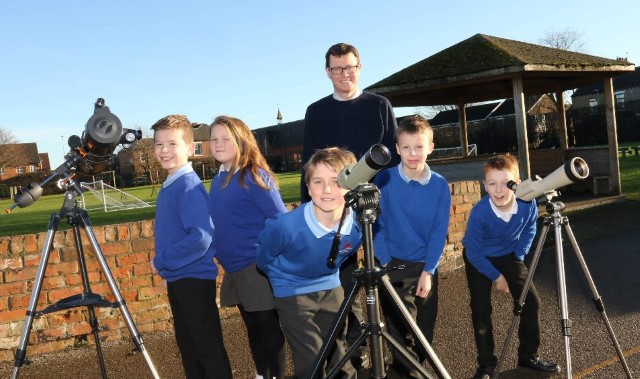CHILDREN have their eyes on the skies after their school picked up a prestigious award for science.
The Primary Science Teaching Trust has awarded Gurney Pease Academy, part of the Education Village Trust, Darlington, an official Quality Mark, making it one of the few in the region to receive the accolade.
The organisation helps improve the teaching and learning of science to children and young people in the UK and the award goes to schools which have demonstrated effort, determination and enthusiasm in delivering science to pupils.
One of the features assessors were particularly impressed with was the school’s thriving astronomy club.
Keen star-gazers have been returning to school when it is dark to use a range of telescopes, one donated by the Wynyard Observatory, the others provided by science lead teacher David Ferrari, to look at planets and constellations.
“The pupils have absolutely loved it,” said Mr Ferrari. “We have been looking at the moons of Jupiter, the rings of Saturn, the Orion Nebular. I wanted to show the children something they don’t normally see, something that is just above their heads – and they were amazed.”
The school also developed an allotment and grew enough vegetables to feed the children for a day and as part of an aim to address space, environment and sustainability it is fostering relations with Stainmore Railway Company, in Kirkby Stephen, so children can experience the steam locomotives it operates.
Itself a green oasis surrounded by housing and industry, Gurney Pease Academy is also developing a wildlife and wilderness area, including a pond to attract flora and fauna, bird boxes and bird feeders.
They have replicated ancient boat burials using models made from aluminium and paper, which will be dug up to see if the materials have degenerated according to their predictions.
Mr Ferrari said: “We did some visioning with the students where we asked them what they would like science to look like in school. We are trying to develop young people as responsible citizens of planet Earth so they can look after its resources for the future.
“”It is great to receive the Primary Science Teaching Trust Science Quality Mark which is recognition that that the school really does care about the subject. This is a development programme for all the staff and offers brilliant continuous professional development, complete with an action plan and regular evaluation.
“It is making learning real, tangible. It teaches pupils how to observe, question and explore science. Working with our mentor, consultant Rosemary Feasey, it represents the beginning of a process that will constantly improve science in our school.”
